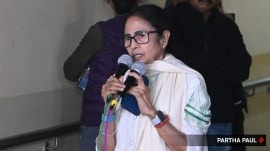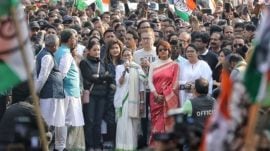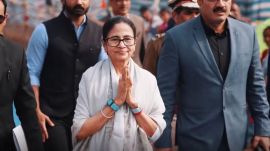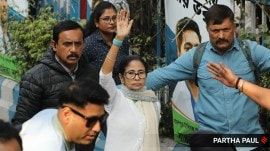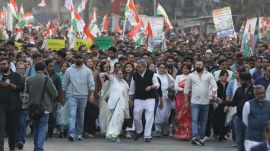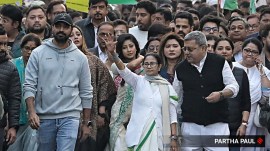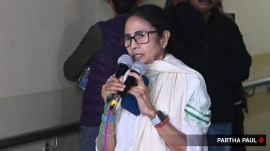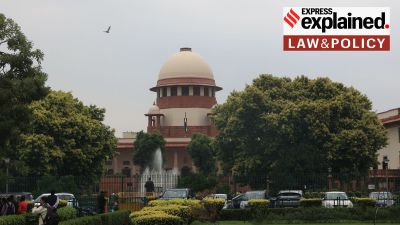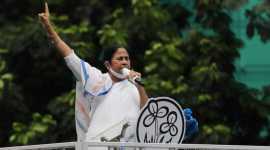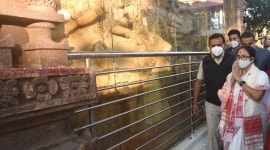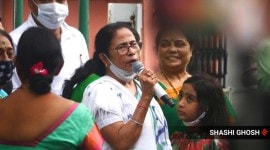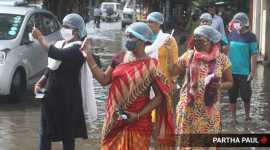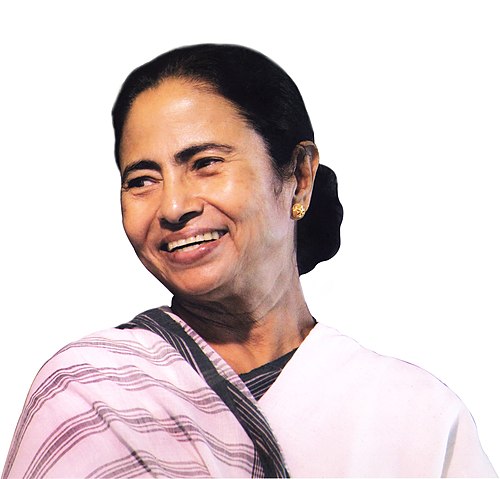 Image Source : Wikipedia
Image Source : Wikipedia
- Born 05 January 1955
- Age 70
- Birth Place Calcutta, (now, Kolkata, ),, West Bengal India
- Profession Politician, Painter, Poet
- Political Party All India Trinamool Congress, (1998-present)
- In Office Minister Of Railways 22 May 2009 - 19 May 2011, Minister Of Coal 9 January 2004 - 22 May 2004, Minister Of Mines 9 January 2004 - 22 May 2004, Minister Of State For Human Resource Development 1991-1993, Cabinet Minister (without Portfolio) 8 September 2003 - 8 January 2004, Member Of Parliament, Lok Sabha 1991-2011
- Residence 30-B, Harish Chatterjee Street, Kolkata
Other Related Pages:
- All India Trinamool Congress 1998 Present,
- Chief Minister,
- West Bengal
Mamata Banerjee BIOGRAPHY
Last Updated : 09 Feb 2025Mamata Banerjee PERSONAL LIFE
| Education | University of Calcutta |
POSITIONS HELD BY Mamata Banerjee
| Position | Tenure |
|---|---|
| Member of the 8th Lok Sabha | 31 December 1984 - 27 November 1989 |
| Member of the 10th Lok Sabha | 20 June 1991 - 10 May 1996 |
| Member of the 11th Lok Sabha | 15 May 1996 - 4 December 1997 |
| Member of the 12th Lok Sabha | 10 March 1998 - 26 April 1999 |
| Member of the 13th Lok Sabha | 10 October 1999 - 6 February 2004 |
MAMATA BANERJEE NEWS
Mamata has ‘made a pattern to take law into her hands’ ‘misused state police’: ED approaches Supreme Court for urgent hearing in I-PAC case
January 12, 2026 1:17 pm
In the Supreme Court, ED said its officers searched the residential premises of I-PAC founder Pratik Jain “in view of material available showing the receipt of proceeds of crime of more than Rs. 20 crore.”
ED moves SC for CBI probe into Mamata’s ‘interference’ during raids on I-PAC office
January 12, 2026 1:00 pm
TMC govt has already filed caveat, agency may seek urgent hearing
You won’t reply, but my duty to inform: CM Mamata Banerjee writes to CEC
January 11, 2026 8:29 am
Says 77 died due to SIR, hearing process lacks sensitivity
Row over searches on I-PAC: ED to move SC, Bengal govt files caveat
January 11, 2026 8:01 am
Both the ED and the Trinamool Congress have already filed petitions in the Calcutta High Court. On Friday, Justice Suvra Ghosh of the Calcutta High Court adjourned hearing on the petitions to January 14
Who is Pratik Jain? Inside the rise of I-PAC’s key strategist at the centre of the ED-TMC faceoff
January 12, 2026 9:46 am
Jain, who started his professional career as an analyst with Deloitte, was among the early members of Citizens for Accountable Governance (CAG) before joining I-PAC.
ED raids on I-PAC have only strengthened TMC and Mamata Banerjee
January 10, 2026 2:58 pm
For the 2026 West Bengal Assembly elections, the BJP was counting on the Election Commission’s Special Intensive Revision (SIR) as its saviour. When that appeared to fail, the BJP has now reverted to its tried-and-tested technique of using central agencies for political battles, as we saw this week
Daily Briefing: India calls Lutnick's claims on trade deal with US 'inaccurate'
January 10, 2026 9:55 am
In today's edition: Tracing the nerve-wracking journey of Piprahwa gems to India; Freedom at Midnight review; and more
Express View on ED and TMC clashing in West Bengal: It should not be Your Agency versus My Police
January 10, 2026 12:49 am
The Opposition should certainly call out the weaponisation of Central agencies by the BJP-led political establishment, just as the BJP did when the CBI was called a “caged parrot” during the UPA regime. But Mamata Banerjee's methods risk undermining her own cause
Return of Mamata Banerjee the 'street fighter': Why TMC sees political advantage in ED face-off
January 10, 2026 8:45 am
While Trinamool Congress insiders say the central agency’s actions have provided it with a rallying point before the Assembly polls, BJP and CPM continue to target Bengal CM, say her actions constitute a “penal offence”.
'This is democracy, not BJP’s private property': Mamata Banerjee hits streets as TMC-ED faceoff over I-PAC raids turns physical
January 09, 2026 7:11 pm
The Chief Minister led a protest march in Kolkata, joined by senior TMC leaders and party workers, to register opposition to the ED raids.
MAMATA BANERJEE PHOTOS
Mamata Banerjee carries out colourful procession to thank UNESCO for Durga Puja's heritage recognition
September 02, 2022 11:02 am
The West Bengal government on Thursday organised a mega rally to thank UNESCO for bestowing Durga Puja with the cultural heritage tag
Colourful tableaux, folk dance, conch sound: Bengal celebrates Durga Pujo UNESCO tag
September 01, 2022 7:37 pm
Colourful tableaux, folk dance, conch sound: Bengal celebrates Durga Pujo UNESCO tag with pomp and vigour
UP, Tamil Nadu, to Tripura: How state chief ministers marked Independence Day
August 15, 2022 6:25 pm
India@75: How chief ministers across country celebrated marked Independence Day
At Martyrs' Day rally, Mamata flays BJP, sets tone for 2024 polls
July 21, 2022 4:49 pm
At the Martyrs' Day rally, Mamata Banerjee criticised the BJP for destroying institutions of the country, contending that those who had no role in the Independence struggle are now trying to rewrite the country's history.
After six-year gap, judges and chief ministers meet to iron out issues in judiciary
April 30, 2022 3:07 pm
After a gap of six years, a joint conference of chief ministers and chief justices of high courts was held today in presence of Prime Minister Narendra Modi and Chief Justice of India N V Ramana.
As TMC pulls off landside win in KMC polls, Mamata visits Kamakhya temple
December 21, 2021 10:21 pm
Mamata Banerjee arrived in Guwahati in the afternoon and drove straight to the temple atop the Nilachal Hills where she was received by the temple's priests.
Mamata Banerjee wins Bhabanipur bypoll, supporters celebrate
October 03, 2021 9:49 pm
The Trinamool Congress has also won the Shamserganj and Jangipur seats.
Bengal bypolls: Bhabanipur votes to decide Mamata's fate
September 30, 2021 10:44 pm
The voter turnout at the Bhabanipur constituency stood at 53.32 per cent at 5 pm.
Floods bring further misery for Bengal residents amid pandemic
August 06, 2021 9:02 pm
Mamata Banerjee blamed the DVC for being responsible for the floods in Bengal.
No place for violence: Mamata Banerjee after CM oath
May 05, 2021 12:48 pm
Mamata Banerjee took oath at Raj Bhavan amid post-poll violance in West Bengal that claimed at least 14 lives in two days.
More Entertainment


MAMATA BANERJEE VIDEOS
Mamata holds dharna, accuses Centre of misusing CBI for political vendetta
June 22, 2020 6:03 pm
West Bengal Chief Minister Mamata Banerjee is holding an indefinite protest following the CBI's attempt to interrogate the Kolkata Police Commissioner Rajeev Kumar.
Why a leader is aligning with someone is more important that who aligns with who; Mamata Banerjee has a major role: Amit Mitra, Bengal Finance Minister
June 22, 2020 6:10 pm
Bengal FM Amit Mitra talks about demonetisation, the problems with GST, failing Centre-state relations, the need for protecting and building institutions such as the RBI and CBI, investments in the state, and what the BJP “doesn’t get about Bengal".
Want a dialogue with all parties to settle the Ayodhya dispute, says union minister Uma Bharti
June 22, 2020 6:12 pm
Union Minister Uma Bharti has said that leaders across party lines must come together and sort out the Ayodhya dispute through dialogue. She also said that those in the government want to build a temple at the disputed site but will need support from
Poor firefighting mechanism makes dousing fire at Kolkata's Bagree market difficult
June 22, 2020 6:16 pm
Over 60 firefighters were pressed into service even as the fire at Kolkata's Bagree market continued to spread. Congested lanes and lack of firefighting mechanism made the task for firefighters extremely difficult. See more: https://bit.ly/2M2t86i
Kolkata bridge collapse: Rescue operations continue at the site, Mamata Banerjee to visit at 2 pm
June 22, 2020 6:17 pm
At least one person was killed and 25 others injured in south Kolkata after a portion of the Majherhat bridge collapsed on Tuesday. The rescuers did not find anyone trapped in the debris overnight, but a police officer said clearance operations was
What is the Assam NRC and what it means to be left out of it
June 22, 2020 6:20 pm
With 40 lakh people being left out of the Assam NRC, there is a huge debate on what their future is. Here's a look at what the Assam NRC is and how the government is addressing the controversies.
Idea Exchange With Sugata Bose, Historian and TMC MP
June 22, 2020 6:20 pm
Sugata Bose, TMC MP from West Bengal and a prominent historian has been critical of the government in the Parliament. At Idea Exchange, he expresses concern over the ‘poison of religious hatred’ being spread and discusses many pressing issues.
The Mamata Banerjee Interview
June 22, 2020 6:56 pm
Supreme Court Rejects Mamata Government's Plea In Narada Sting Operation Case
June 22, 2020 7:07 pm
